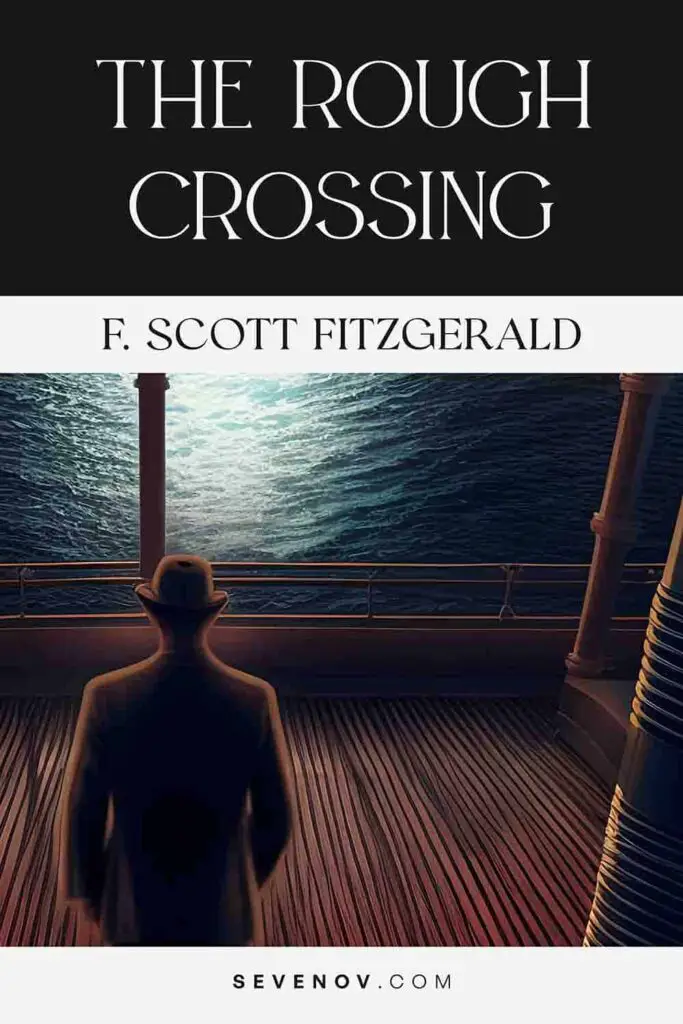
The Rough Crossing by F. Scott Fitzgerald
Author: Francis Scott Fitzgerald
Published: The Saturday Evening Post (June 8, 1929)
Genre: Short Story
Read The Rough Crossing online at PageVio
“The Rough Crossing” is a short story by F. Scott Fitzgerald published in The Saturday Evening Post on June 8, 1929.
1. The Rough Crossing Synopsis
The story revolves around a couple, Adrian and Eva, as they embark on a cruise, seeking an escape from their troubles. The narrative unfolds in three distinct sections. Initially, the setting is serene as the ship departs, but underlying tension is hinted at. As the cruise progresses, the second part explores their growing emotional distance, exemplified by Eva’s illness and Adrian’s interactions with another woman, Betsy. The stormy weather mirrors their inner turmoil.
The final section sees their relationship further unraveling, climaxing when Eva goes missing during the storm. The story concludes with their introspective reflection and longing for unity. Symbolically, the ship’s journey parallels the emotional voyage of the couple, traversing calm, turbulence, and reconciliation. Through its structure and symbolism, the story delves into human connection, personal struggles, and the transformative power of shared experiences.
2. Story Summary
Chapter 1
The passage on a ship’s deck captures the transitional state between departure and arrival. The atmosphere is ghostly and uncertain, especially at night, as the ship enters a realm that’s neither here nor there. The scene shifts from the bustling pier to the ship’s interior, where the sense of place narrows. Celebrity Adrian Smith and his wife Eva escape their worries by sailing to France. As they embrace on the promenade deck, they revel in their getaway.
The ship’s formal passengers initially seem aloof, but Adrian predicts familiarity will develop. A young girl among a group catches Adrian’s attention. Back in their private moment, Adrian and Eva discuss their future, their relationship, and their hopes for a harmonious journey. The ship departs amid farewells, the crowd fading into the distance. Unbeknownst to them, a hurricane forms, foreshadowing the turmoil that awaits the ship on its voyage.
Chapter 2
Adrian and Eva, on a cruise, visit the smoking-room despite their initial reluctance. The ship’s atmosphere is tense, aching for diversion. They interact with other passengers, including Adrian’s fascination with a girl named Betsy. Later, as the ship sails into rough weather, Eva falls ill, while Adrian and Betsy grow closer. Eva questions Adrian’s actions and their relationship, leading to a tense evening. Adrian, however, is seemingly unaware of Eva’s distress. The storm rages on, reflecting the turmoil in their emotions. Eva’s anger intensifies as she believes Adrian is with Betsy. The couple’s relationship unravels as Eva’s cries and despair fill the night air, symbolizing the storm within her soul.
Chapter 3
Adrian wakes up during a hurricane on a ship. He finds that a trunk is being tossed around the cabin due to the storm. His wife Eva is unharmed and asleep. Later, Eva wakes up feeling unwell due to the storm’s effects and insults a nurse. A doctor prescribes a bromide for her. Adrian and Eva recall the previous night’s events, including Eva throwing her pearls overboard. They witness a burial at sea due to the storm’s severity.
Eva’s behavior becomes erratic as she drinks and interacts with another passenger, Butterworth. She becomes upset with Adrian and expresses a desire for a divorce. When she goes missing during the storm, Adrian searches for her and rescues her from being washed overboard by a wave.
Chapter 4
Two days later on a train to Paris, Adrian tries to engage his children with the scenery but they prefer the boat. Adrian and Eva discuss the recent events, feeling disconnected from them. They mention cashing Butterworth’s check and encountering Miss D’Amido. They consider the past events as a nightmare and ponder the identity of the other “Adrian Smiths” on the boat. They express a desire to remain together and reflect on the idea that those events didn’t truly define them.




